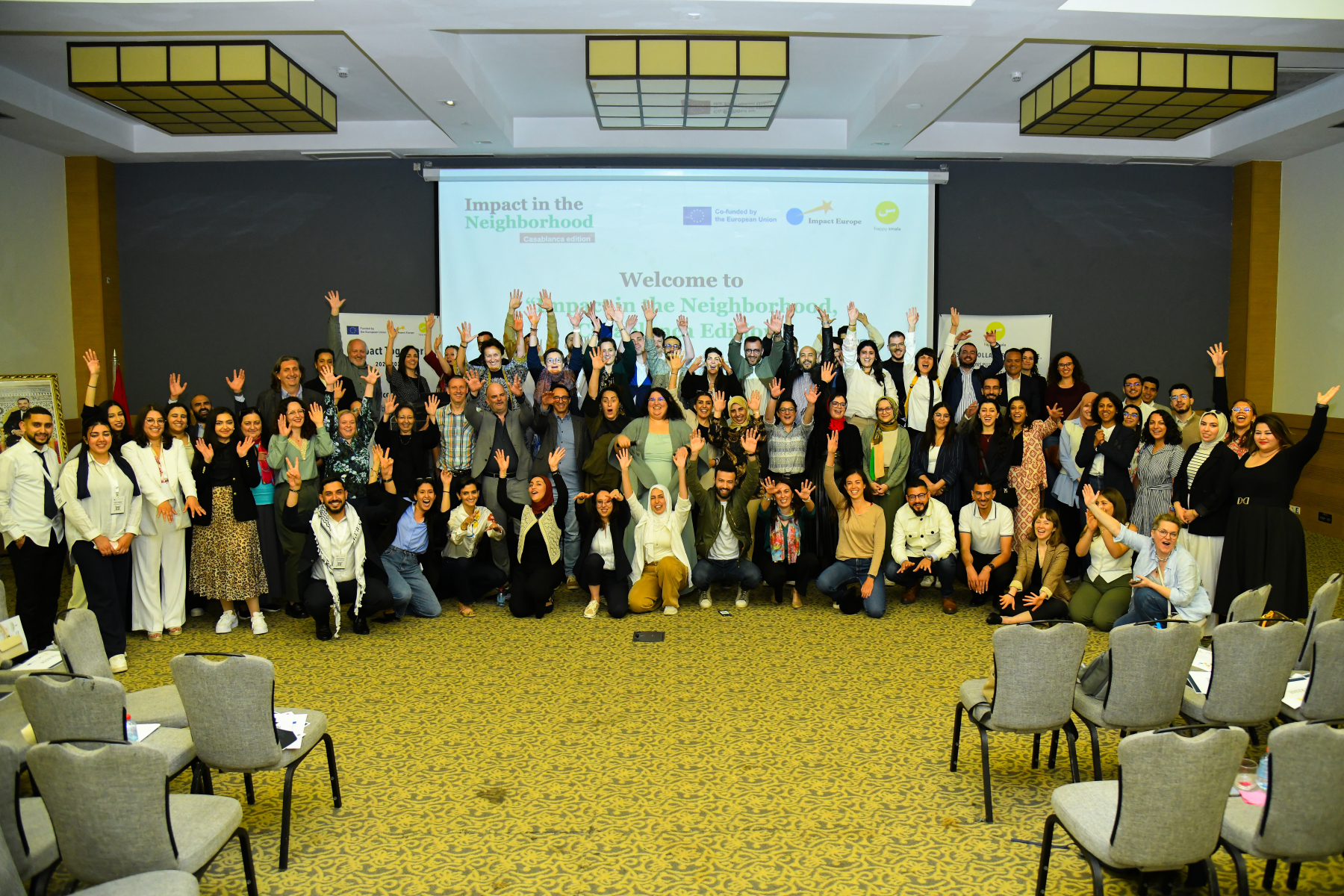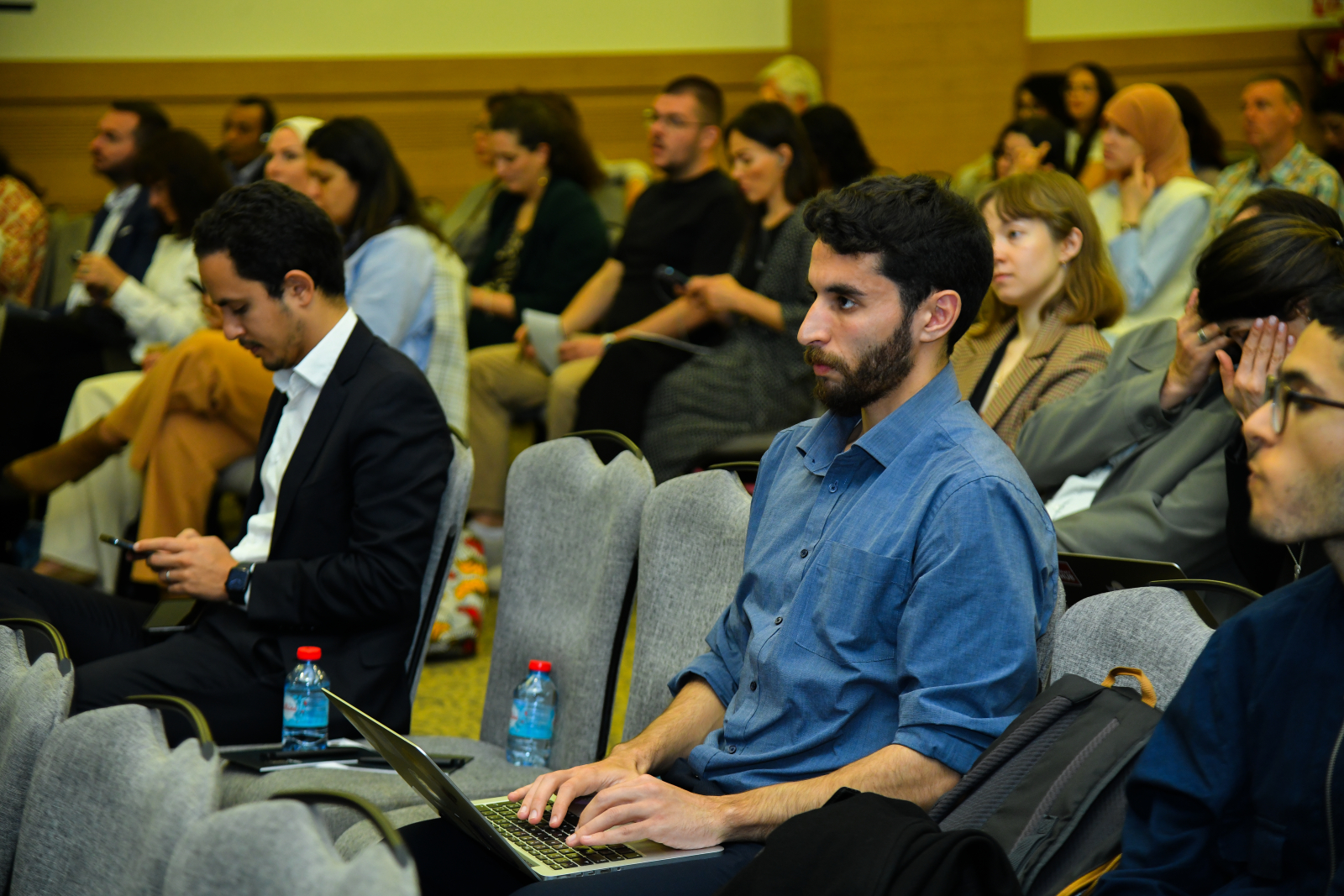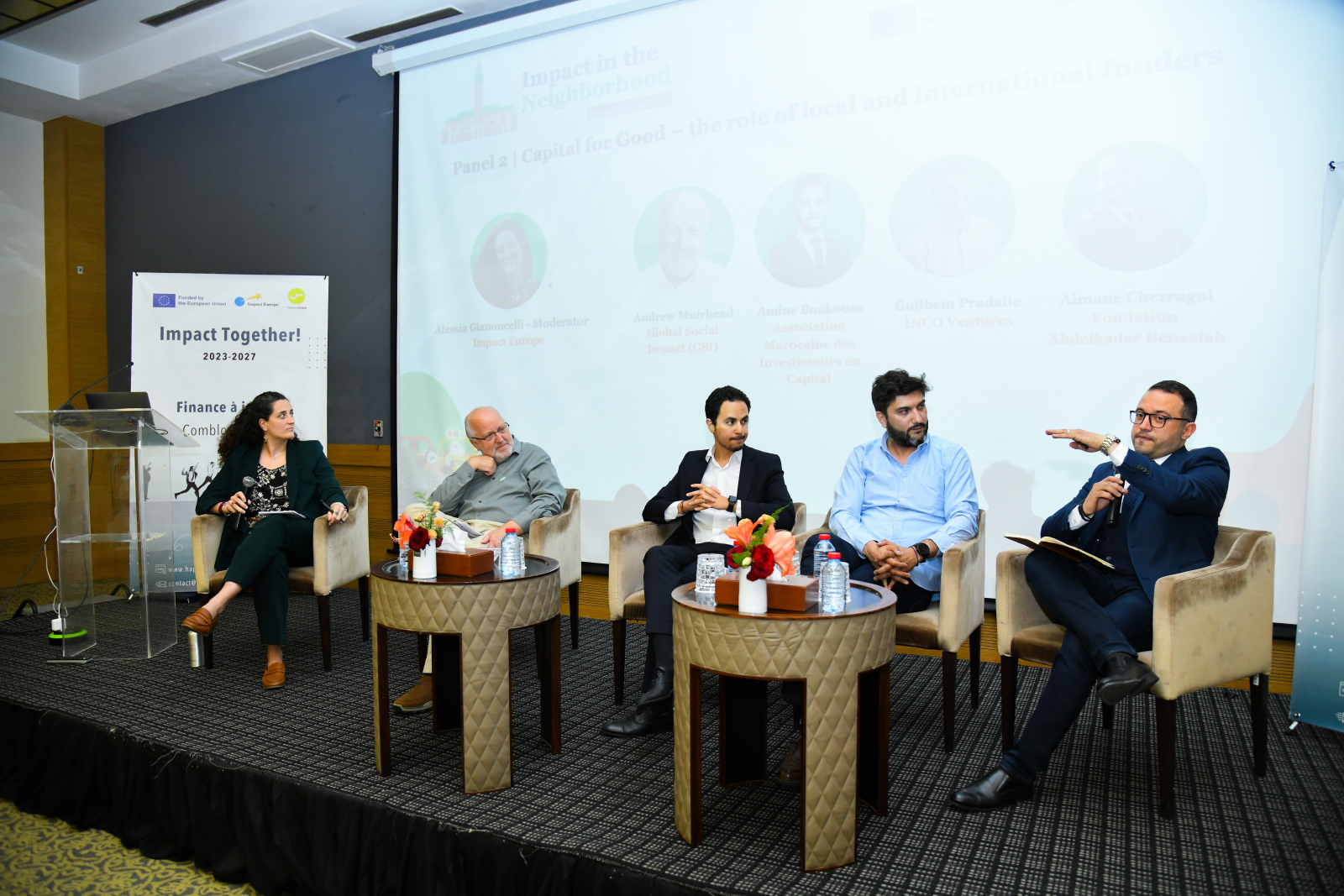Take-aways from Impact in the Neighborhood
For the second time, Impact Europe convened under the banner of Impact in the Neighborhood – a cross-regional event that brings together impact ecosystem players from different emerging and developing countries to share experiences, inspire new actions and accelerate investing for impact.

The first gathering in Tbilisi, in 2023, was a pioneering format that united our partners from the EU-funded Collaborate For Impact-project with those of Impact Together!, it’s EU-funded counterpart in the MENA-region. While their national contexts were (and continue to be) drastically different, it was the similarities that stood out, and the platform proved to be a meaningful and effective way of creating connections for the long term.
Now, in Casablanca, these partners reunited and were joined by a cohort of new organizations hailing from the Western Balkans – the newest upcoming addition to our market building scope.
By way of introduction
There is an important place for in-person meetings, says Céline Anselme, part of the EU Delegation to Morocco. In her introductory word, she highlights the growing importance of impact finance in the country. “It is an evolution of high significance for the EU Commission, which has been supporting this work through the Social Economy Action Plan. We are very optimistic when looking at the agenda today, and seeing changes like the Arab Impact Network taking hold”. Anselme also confirms the lasting support of the DG MENA, formerly a part of the DG NEAR, to these projects.
Ewa Konczal (Impact Europe) and Eric Asmar (Happy Smala) subsequently shared examples of how impact is needed in emerging economies. Impact investing manifests itself as a way of picking up the slack when other sources of funding remain absent. Targeted capital gathered through bottom-up approaches can make a difference – it is a message that would resonate throughout the entire conference.

A look at what is needed
The first panel of the day focused on the state of entrepreneurship in the different regions represented at the event. Yannis Hendrickx, active at Technopark, an incubation space and network for entrepreneurs in Casablanca, sees shy progress, but a lot of work to be done. “Getting access to financing is still a big problem, as there is a lack of developed incentives for social entrepreneurs. Nevertheless, we are in the phase of social impact – we try to bridge the gap with rural regions in terms of facilities, health care and education. We also work on the age gap, since the young are much more informed than the elder about all kinds of opportunities”.
What is crucial in meeting these challenges, is to be in permanent discussion about what is needed, says Gevorg Poghosyan, CEO of Impact Hub Yerevan. “At first, we were very enthusiastic about pursuing legislation. But while we started working around an enabling policy framework eight years ago, we have slowly shifted our attention to raising more awareness and informing policy makers of the work on the ground. Debating what is needed and finding solutions had more benefits than only focusing on a final piece of policy to be achieved.”
One argument that can weigh heavily in these debates, is measurable impact. Safia Tmiri, Executive Director of Alfanar, stresses the importance of not only finding financial support, but also providing capacity building and non-financial support, especially when it comes down to making impact empirically visible. “The market in the MENA-region is both fragile and resilient”, Tmiri says. “It is fragile when you look at the 600 billion dollar deficit in SDG spending, or the estimated 300 billion reconstruction cost faced by the Arab world due to geopolitical conflict. But it’s also a story of resilience, if you look at the social entrepreneurs who rise to the occasion.”
All three panelists agreed that there is a need for a more structural framework for social entrepreneurs, to enable them to not only get grant and loan support, but actual equity investments, too. Being integrated in the industry value chain was identified as a crucial next step in embedding social enterprises into daily life of end consumers.
The right people
Another step in creating a framework was made straight after the first panel. Representatives of different partner organizations in the MENA-region announced the launch of the Arab Impact Network (AIN), the first dedicated network for impact ecosystem players in the Arab region. We have covered this launch in a previous article, and do recommend filling in the form at the end if you have any links to impact in the Arab world.
It is absolutely crucial to set up these networks, and to bring people together in that way. This was confirmed by Andrew Muirhead of Global Social Impact. “International funders should listen to the social context of the countries they invest in – any investment needs to be localized. Having a network that shares this knowledge, like AIN aims to do, is what it is really all about”.
He is joined on stage by Guilhem Pradalie of INCO Ventures, Amine Boukouss of the Moroccan Association of Capital Investors and Aimane Cherragui of the Fondation Abdelkader Bensalah, for a panel on how to better involve local investors. In the words of Boukouss, they are not the “evil finance guys”. Quite the contrary – any investment that has impact, will always be more attractive to any investor. “But throwing money at an issue will not make it go away. You need to have a good team, strong products and a mature approach”.
It is a concern that is shared by his co-panelists, who stress the importance of combining different elements. Cherragui shares some of the experiences of the Fondation in providing blended finance backed by incubation, mentorship, coaching and guidance, rather than charity. Muirhead stresses the importance of “human and intellectual capital. If you have these, you can start putting the puzzle pieces together, and create a powerful trifecta of government, private and social funding.
And this takes time. Pradalie shares INCO’s journey in trying to set up impact funds on the African continent, which has been challenging. While they would like to invest in African start-ups, the pre-investment process has been long and arduous. Still, Cherragui pleads for “patient investment – social impact does not follow the timeline of technological or industrial change”.

Agility through crowdfunding
If time is not at hand, crowdfunding can provide an alternative. Eric Asmar of Happy Smala, Lama Amr of BuildPalestine and Nasser Kettani of Akkan Crowdfunding built the case for this way of funding in the last open panel of the day.
The numbers can go up quickly when you set up a crowdfunding campaign that has the right urgency. “In the first week after the earthquake that hit Morocco in 2023, we gathered more via crowdfunding than in the ten years before that, combined”, tells Asmar. “The awareness of how to access and to contribute to these campaigns is rising”.
This makes them agile and crucial tools in an environment where institutional funding is diminishing, or slow to be awarded, says Amr. “Crowdfunding is a trust-based tool. In that sense, it is very democratizing – anyone can contribute, whenever they want, as much as they want.” But with these advantages come responsibilities, says Kettani. “It is not just a financing tool. Crowdfunding is as much about building a community as it is about raising funds.”
The discussion on crowdfunding was capped by the launch of the Happy Smala Crowdfunding Barometer, which related the main metrics kept by Happy Smala on the state of the crowdfunding landscape in Morocco. We will feature this barometer in a future article, very soon. After the panel discussions, attendees were free to participate in a series of workshops, ranging from impact measurement to building investor communities. A long day, but one that marks a start, and not an end destination.
TL;DR? A few bullet points for further reflection
- There is at least as much opportunity as there is challenge when it comes to investing for impact in the Arab world, as quoted by Safia Tmiri of Alfanar. Taking action is crucial, and raising awareness can be the more efficient route towards enacting policy change over the longer term, while also answering the needs of social enterprises directly.
- True power lies in unity - the Arab Impact Network is one step in that direction, and a name to remembered and shared in your own networks.
- Investing for impact in emerging countries requires the patience to build a framework, a good team and enough intellectual capital to attract not only local, but international investors.
- Crowdfunding can be a powerful tool in the impact organisation toolbox. Happy Smala and BuildPalestine have already used it to great effect in their own work.
Eager to get involved? Impact Europe is running several programs in emerging and developing economies, trying to establish impact funds, engaging with stakeholders and building an ecosystem for impact in the process. Reach out to us, and we are happy to get you introduced!
